In the JWF fund 2020, we have received 347 applications from 35 countries.
As a result of selection, we have decided to provide funds for 7 projects from 6 countries, 3 from Asia and 4 from Africa.
Recipients of JWF Fund 2020
*The following text is basically taken from their application forms and were written by the organizations themselves.
1.Construction of protected spring well in Kake village, Cameroon
Outline of the project
・Organization: Bridgers Association Cameroon (#047)
・Original project title: CONSTRUCTION OF A PROTECTIVE STRUCTURE OVER A WATER RESOURCE COLLECTION POINT IN KAKE-CAMEROON
・Country/Area: Cameroon/ Mbam-et-Kim Division
・Project period: October 2020 to February 2021
・Number of expected beneficiaries (Direct): 550 people (Female 150, male 136 and children 264)
・Cost: USD 1,205 (JWF Fund USD 1,000 and contribution from Bridgers Association 205 USD)
Background
Access to government water services such as potable running water are inexistent in the village of Kake. Women and children are responsible for fetching water from the main water collection point, which is more than 40 min (900m) away from the households. This problem is compounded by the fact that the main source of water may at some point be contaminated due to an unhealthy surrounding environment and the rapid deterioration of protective structures around the natural water spring, leaving it unprotected and completely open. This condition exposes the source to external intrusions, such as debris, animals, and bird defecation.
Main contents of the project
– Construction of a protected spring water facility and improvement of surroundings
– Campaign on proper hand washing to prevent COVID-19
– Campaign on proper handling and use of the constructed facility
– Campaign on maintaining and repairing the infrastructure for sustainability
– Establishment of a water management committee and a funds collection committee
– Water quality test
Expected outcome
Through improvement of the drinking water source, a better living environment for the community is expected.
Current situation of the project site
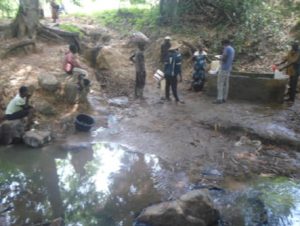 |
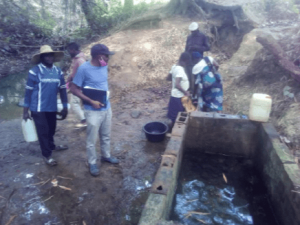 |
| Natural spring which community people fetch water | Feasibility study by WASH program manager of Bridgers Association Cameroon |
2.Construction of protected spring well in Kisega village, Uganda
Outline of the project
・Organization: Multipurpose Training and Community Empowerment Association (#056)
・Original project title: Increasing access to safe and clean water, hygiene and sanitation through protection of spring well
・Country/Area: Uganda/Namutumba district
・Project period: October 2020 to February 2021
・Number of expected beneficiaries (Direct): 1,674 people
・Cost: USD 1,644.7 (JWF Fund USD 946.14, contribution from the Multipurpose Training and Community Empowerment Association 101.73 USD, beneficiaries 404.69 and other organization 191.51)
Background
For years, St Peter Kisega Primary School and the people of Kisega Village have been collecting water from an unprotected spring well located 200 meters away. It is unsafe and contaminated, and to make matters worse, is shared by humans and animals. Cases have been registered at local health centers of children and adults suffering from water-related diseases, such as typhoid, trachoma, and diarrhea, resulting in some pupils dropping out of school. Four girls have drowned in the water because of slippery timber steps and a lack of barriers.
Main contents of the project
– Construction of a protected spring well facility
– Sensitization on hygiene and sanitation (2 times)
– Sensitization on COVID-19 measures
– Establishment of a water user committee
– Training on maintenance and management of the facility to the committee
– Water quality test
Expected outcomes
Through improvement of the drinking water source, a better living environment for the community’s residents and school children is expected.
Current situation of the project site
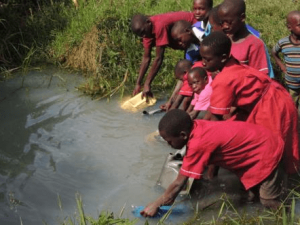 |
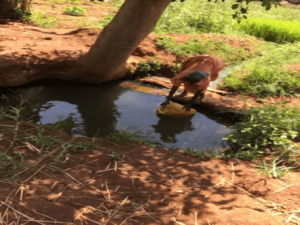 |
|
Pupils fetching water from the unprotected spring well |
Woman fetching water from unprotected spring well |
3.Installation of hand-washing facilities in Thapathali slum, Nepal
Outline of the project
・Organization: ‘We’ for Change (#181)
・Original project title: पानी पधेरो (Pani Padhero, English Translation: Water Station)
・Country/Area: Nepal/Kathmandu district
・Project period: October 2020 to February 2021
・Number of expected beneficiaries (Direct): 650 people
・Cost: USD 1,170 (JWF Fund USD 1,000, contribution from ‘We’ for Change 110 USD and slum association 60 USD)
Background
‘We’ for Change carried out community-based research and found that people in the slum of Thapathali are exposed to major water-borne diseases. They live in poor conditions, lack knowledge on WASH and have no water for maintaining regular hand washing practices. There are frequent outbreaks of cholera and dysentery.
Main contents of the project
– Installation of two eco-friendly hand-washing stations
– Workshop on water, sanitation and hygiene (WASH)
Expected outcome
Through improvement of hygiene, a better living environment for the community is expected.
Current situation of the project site
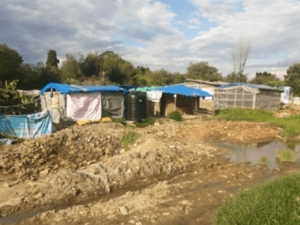 |
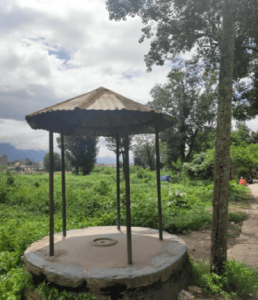 |
| Thapathali slum | Site for installing the hand-washing facilities |
4.Construction of double VIP latrines in Sparly Dehri village, Pakistan
Outline of the project
・Organization: Shama Social Village Development Organization (#346)
・Original project title: Improvement of “Sanitation facilities” in Village
Sparly dehri – Pakistan
・Country/Area: Pakistan/Charsadda District
・Project period: October 2020 to February 2021
・Number of expected beneficiaries (Direct): people
・Cost: USD 2,154 (JWF Fund USD 1,000, contribution from beneficiaries 322.7 USD, Shama Social Village Development Organization 525.3 USD)
Background
In the village of Sparly Dehri, there is a lack of sanitation facilities and hygiene education. The village’s residents use open spaces around their houses for defecation and washing. Domestic animals such as dogs, ducks and other fowl feed on the excrement. According to the Organization Survey, conducted in 2018 and 2019, about 60 % of the population still openly defecates, in the absence of proper sanitation facilities. Fecal pollution is a real issue in the target area. It contaminates drinking water sources and causes water-borne diseases such as diarrhea and malaria.
Main contents of the project
– Construction of five double-VIP* toilets
– Training sessions on good hygiene practices (2 times)
– Cleaning of open defecation site
– Establishment of Operation and Maintenance Committee
– Training on maintenance of the toilets
*VIP: Ventilated Improved Pit toilet is a sanitary facility equipped with ventilation pipes to prevent odors and flies from occurring.
Expected outcome
Through improvement of sanitation, a better living environment for the community is expected.
Current situation of the project site
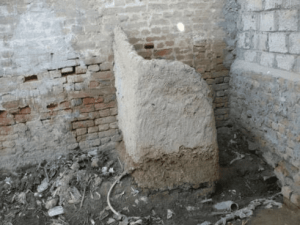 |
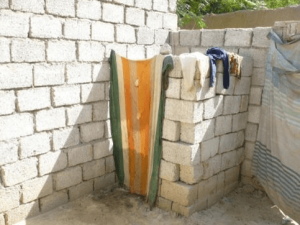 |
|
Peoples uses the space as toilet pits currently |
Currently used for both, washing & toilets |
5.Installation of water kiosk in Kibera slum, Kenya
Outline of the project
・Organization: Women Promotion Centre (WPC) (#256)
・Original project title: Establishment of Community-owned water “Kiosk” in Kibera slum
・Country/Area: Kenya/Nairobi County
・Project period: October 2020 to February 2021
・Number of expected beneficiaries (Direct): people
・Cost: USD 1,850 (JWF Fund USD 1,000, contribution from beneficiaries USD 400 and WPC USD 450)
Background
Because Kibera is a slum, water there is costly, contaminated, scarce, and unreliably supplied. Women and children queue up for long hours and have to make long trips to and from water vendors in order to obtain water. The community continues to experience a high levels of gender-based violence, including sexual violence, targeted at vulnerable women and children. On their way to and from collecting water, women and girls are attacked by men, arrive home late and end up being abused by their male partners or guardians.
Most households in Kibera spend almost 20% of their income on water. Residents are charged a lot for water, yet there is no guarantee that it is safe and clean. The high disease burden has exacerbated poverty in Kibera since most households must spend the majority of their income on medication.
Main contents of the project
– Installation of a water supply station (Water kiosk)
– Training to 20 WASH promoters in best water sanitation and hygiene practices
– Establishment of 2 water management committees
Expected outcome
Through improvement of the water supply system, a better environment for the community especially women and children is expected.
Current situation of the project site
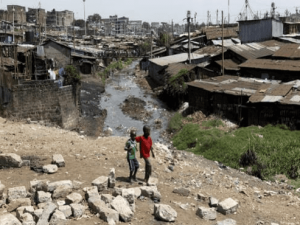 |
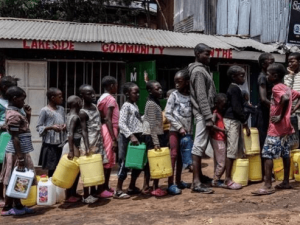 |
|
Contaminated and polluted water source |
Children queuing up at a water point |
6.Installation of water storage tank in Batapiyasa kanda community, Sri Lanka
Outline of the project
・Organization: Human-Environment Links Progressive Organization (HELP-O) (#064)
・Original project title: Innovative approach to manage shattered water supply from a natural spring to distribute the water to the settlements nearby
・Country/Area: Sri Lanka/Galle District
・Project period: October 2020 to February 2021
・Number of expected beneficiaries (Direct): 600 people
・Cost: 1,376 USD (JWF Fund USD 976, contribution from beneficiaries 100 USD, HELO-O 150 USD and other organization 150 USD)
Background
In the community of Batapiyasa Kanda, the residents lack water and the little amount that they do get is unhygienic and full of pathogens. Because of their poverty, the residents don’t have enough money to afford a daily water source. Thus they tend to go hungry for weeks at a time. Many of them must stay in hospital rather than at home because of dehydration. They are prone to dangerous viruses and diseases.
Main contents of the project
– Building a water tank
– Installation of pipe lines
– Educational programs on how the system and facilities
– Training on operation and maintenance
– Water quality test
Expected outcome
Through improvement of the water supply system, a better living environment for the community is expected.
Current situation of the project site
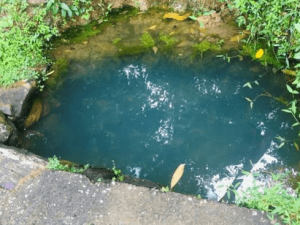 |
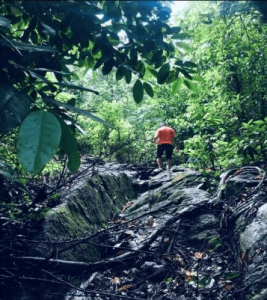 |
|
Water source for the pipeline |
Steep trail to the water source |
7.Installation of Rainwater harvesting tanks to four public primary schools, Kenya
Outline of the project
・Organization: Elite Community Development Empowerment Programme (ECODEP) (#180)
・Original project title: Mitume slum schools hygienic Program
・Country/Area: Kenya/Trans Nzoia County
・Project period: October 2020 to February 2021
・Number of expected beneficiaries (Direct): 3,191 people (Femal teachers 49, male teachers 20 and pupils 3,122)
・Cost: USD 1,629 (JWF Fund USD 975, contribution from beneficiaries 374 and ECODEP USD 280)
Background
The schools in the slum of Mitume, including the target schools Lukhuna Primary School, Masinde Muliro Primary School, Kaloleni Annex Primary and Matisi Primary school, suffer from an absent, insufficient, or unreliable water supply, as well as inadequate sanitation and hand-washing facilities. A majority of the schools’ pupils have been consuming unclean water, resulting in widespread incidence of water-borne diseases, including diarrhea. The school administrations are confronted with the problem of overstretched sanitation and hygiene facilities due to a high enrollment rate and limited resource allocation by the government. Children in the target schools do not wash their hands after using the washrooms.
Main contents of the project
– Installation of rainwater harvesting systems with hand-washing facility to each school
– Training of teachers on hygienic diseases
– Education class on sanitation and hygiene
Expected outcome
Through improvement of the water supply system, a better living environment in the schools is expected.
Current situation of the project site
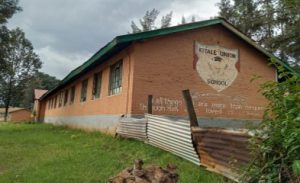 |
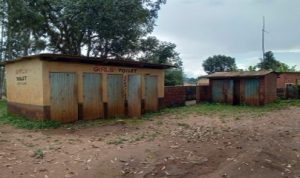 |
| School building of the target school | Existing latrines without hand-washing facility |
Outlines of the JWF Fund 2020
・Application Period: 22 June to 21 July, 2020
・Number of the applications: 334 from 35 countries
・Selected projects: 7 projects from 6 countries; Cameroon (1), Kenya (2), Uganda (1), Nepal (1), Pakistan (1) and Sri Lanka (1)
The projects were selected and decided among 347 applications by screening of JWF staffs.
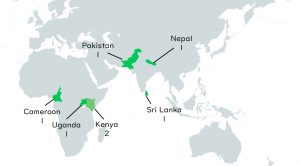
▼For the details of the JWF Fund, please visit following website▼
https://www.waterforum.jp/en/what_we_do/grass_roots_projects/jwf
(Reported by Shigenori Asai, Director and Akie Gunji, Sub manager)
